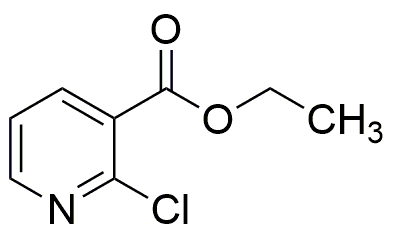Ethyl 2-Chloronicotinate is widely utilized in research focused on:
- Synthesis of Pharmaceuticals: This compound serves as a key intermediate in the synthesis of various pharmaceutical agents, particularly those targeting neurological disorders. Its unique structure allows for the development of new drugs with enhanced efficacy.
- Agricultural Chemicals: It is used in the formulation of agrochemicals, including pesticides and herbicides. Its effectiveness in controlling pests makes it valuable for improving crop yields and ensuring food security.
- Material Science: Ethyl 2-Chloronicotinate is employed in the development of novel materials, such as polymers and coatings, due to its ability to modify surface properties and enhance durability.
- Biochemical Research: This compound is utilized in various biochemical assays and studies, particularly in exploring enzyme interactions and metabolic pathways, aiding researchers in understanding complex biological systems.
- Organic Synthesis: It plays a significant role in organic synthesis as a versatile building block, allowing chemists to create a wide array of complex molecules efficiently, which is crucial for advancing chemical research and innovation.
General Information
Properties
Safety and Regulations
Applications
Ethyl 2-Chloronicotinate is widely utilized in research focused on:
- Synthesis of Pharmaceuticals: This compound serves as a key intermediate in the synthesis of various pharmaceutical agents, particularly those targeting neurological disorders. Its unique structure allows for the development of new drugs with enhanced efficacy.
- Agricultural Chemicals: It is used in the formulation of agrochemicals, including pesticides and herbicides. Its effectiveness in controlling pests makes it valuable for improving crop yields and ensuring food security.
- Material Science: Ethyl 2-Chloronicotinate is employed in the development of novel materials, such as polymers and coatings, due to its ability to modify surface properties and enhance durability.
- Biochemical Research: This compound is utilized in various biochemical assays and studies, particularly in exploring enzyme interactions and metabolic pathways, aiding researchers in understanding complex biological systems.
- Organic Synthesis: It plays a significant role in organic synthesis as a versatile building block, allowing chemists to create a wide array of complex molecules efficiently, which is crucial for advancing chemical research and innovation.
Documents
Safety Data Sheets (SDS)
The SDS provides comprehensive safety information on handling, storage, and disposal of the product.
Product Specification (PS)
The PS provides a comprehensive breakdown of the product’s properties, including chemical composition, physical state, purity, and storage requirements. It also details acceptable quality ranges and the product's intended applications.
Certificates of Analysis (COA)
Search for Certificates of Analysis (COA) by entering the products Lot Number. Lot and Batch Numbers can be found on a product’s label following the words ‘Lot’ or ‘Batch’.
*Catalog Number
*Lot Number
Certificates Of Origin (COO)
This COO confirms the country where the product was manufactured, and also details the materials and components used in it and whether it is derived from natural, synthetic, or other specific sources. This certificate may be required for customs, trade, and regulatory compliance.
*Catalog Number
*Lot Number
Safety Data Sheets (SDS)
The SDS provides comprehensive safety information on handling, storage, and disposal of the product.
DownloadProduct Specification (PS)
The PS provides a comprehensive breakdown of the product’s properties, including chemical composition, physical state, purity, and storage requirements. It also details acceptable quality ranges and the product's intended applications.
DownloadCertificates of Analysis (COA)
Search for Certificates of Analysis (COA) by entering the products Lot Number. Lot and Batch Numbers can be found on a product’s label following the words ‘Lot’ or ‘Batch’.
*Catalog Number
*Lot Number
Certificates Of Origin (COO)
This COO confirms the country where the product was manufactured, and also details the materials and components used in it and whether it is derived from natural, synthetic, or other specific sources. This certificate may be required for customs, trade, and regulatory compliance.


